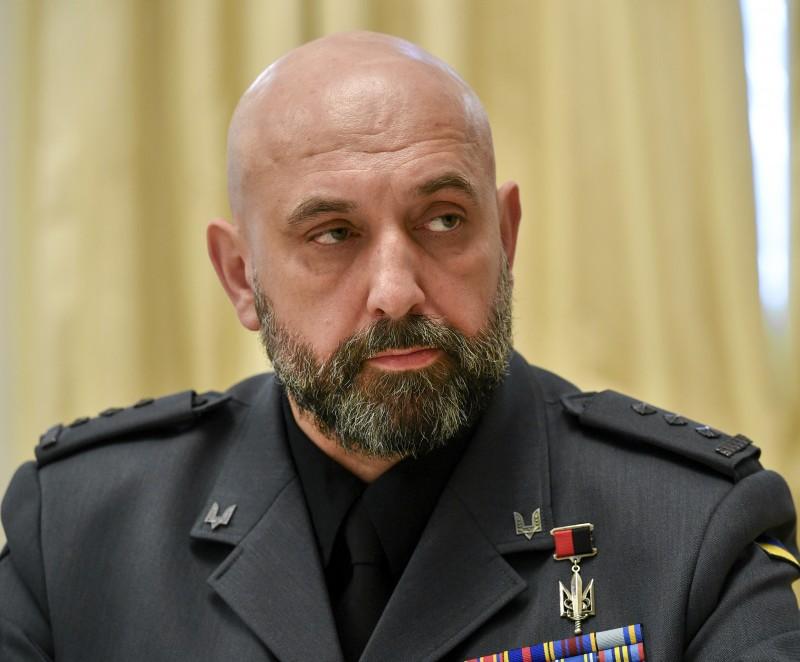
The issue of full-scale resumption of hostilities in Russian-occupied Donbas, eastern Ukraine, remains relevant, says Deputy Secretary of the National Security and Defense Council (NSDC) Serhiy Kryvonos.
"The issue of full-scale armed hostilities in Donbas remains relevant, and not only in Donbas. My stance is that we must be ready to repel any aggressive action by the enemy, from any direction. To this end, we must have the appropriate resources accumulated since artillery shells are not 'canned food.' They will last much longer," Kryvonos wrote on Facebook on October 13.
Boosting the domestic full-cycle production of ammunition is a matter of national security, the senior security official believes.
"A year ago, the deputy head of the President's Office snubbed the issue of building ammo production plants in Ukraine. This year has been lost, but there are opportunities since investors and Ukrainian partners are still awaiting a solution. We are waiting: maybe they'll finally comprehend that a decision must be made," he added.
According to Kryvonos, the war between Azerbaijan and Armenia in the disputed Nagorno-Karabakh region has once again raised the issue of increasing Ukraine's capabilities to produce own artillery shells of various calibers.
The NSDC believes that the hostilities in Nagorno-Karabakh conflict have ceased not only due to the negotiation process, but also over "ammo hunger on both sides."
"Armenia has no domestic production of projectiles and ammunition as such, so they have quickly run out of tactical stocks, with no strategic stocks available. Azerbaijan has been actively using 152 mm-, 155 mm-, and 122 mm-caliber artillery systems. What's more, Azerbaijan has no domestic production of shells, but I'm sure they'll accelerate efforts to address the issue as soon as possible, expanding the development of projectiles output," the official said.
Kryvonos says "thanks to the efforts" of certain senior officials with the General Staff, hundreds of thousands of ammo shells, including large caliber, were destroyed in 2012-2013.
"Every day at their morning meetings, the General Staff would hear reports by chiefs of operational commands, commanders of artillery units about shells having been fired into the void. This lasted for more than one month, more than a year. The same applied to rockets for our Grads, Uragans, and Smerches [multiple rocket launcher systems]," he said.
"They had been deliberately weakening us, and we made ourselves weak on our own in terms of artillery ammo. Besides, such a pace of launches has reduced the life of our barrels as they are like human spine. The issue of probing the perpetrators' actions has not yet been raised, although it's top-tier sabotage! Plus, the situation further worsened over fires at arms depots and military bases," Kryvonos said, adding that the issue of increasing the country's own production of artillery shells of various calibers is the issue of strategic importance.
Read also"Extreme concern" in EU over extended fighting in Nagorno-KarabakhNagorno-Karabakh conflict: Background
On the morning of Sunday, September 27, fighting resumed between Armenia and Azerbaijan in the disputed Nagorno-Karabakh region. Both countries blamed each other for shelling as a result of which they suffered casualties.
Armenia and the unrecognized Nagorno-Karabakh Republic declared martial law and general mobilization.
Azerbaijan, in turn, introduced martial law on September 28. Partial mobilization was announced in that country.
Ukrainian Foreign Minister Dmytro Kuleba has said Ukraine consistently supports the territorial integrity of Azerbaijan.
The UN Security Council has called on Armenia and Azerbaijan to immediately stop fighting.
Nagorno-Karabakh war: History
- The conflict between Azerbaijan and Armenia over the Nagorno-Karabakh region began in 1988 when the predominantly Armenian-populated Nagorno-Karabakh Autonomous Oblast announced its withdrawal from the Azerbaijan Soviet Socialist Republic.
- In 1991-1994, the bloodshed conflict continued in the region, which ended with the signing of a ceasefire protocol. Nagorno-Karabakh proclaimed itself an independent "republic." Azerbaijan did not recognize this, considering the territory to have been occupied by Armenia.

